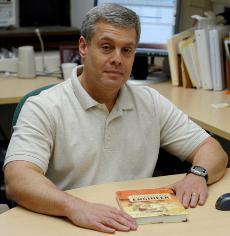Professor aims to boost engineers’ social skills

Sep 13, 2006
Last updated on May 12, 2016 at 04:28 a.m.
There is no question that today’s job market demands a college graduate who is both capable in his field of study and well-rounded in terms of interpersonal skills.
David Goldberg aims to help engineering students rise to these demands with his new book, “The Entrepreneurial Engineer,” which addresses the non-technical skills that are essential for the modern engineer.
Goldberg is a professor in the department of General Engineering and has been on faculty at the University since 1990.
He said that his initial motivation for the book came in 1976 when he took a job with a small entrepreneurial company.
Get The Daily Illini in your inbox!
“It was a wonderful experience, but also terrifying experience,” Goldberg said. “I did sales calls. I was writing service plans. There were a lot of non-technical skills. I didn’t feel my engineering education had prepared me for that.”
Goldberg said the void he felt existed in his education was filled by the skills he learned at that job. However, in today’s job market, employers are less likely to allot time and money to help engineers improve their non-technical skills, Goldberg said.
The surface-level message of “The Entrepreneurial Engineer” is that engineers need a broad range of communication skills to be successful. This includes writing well, making good presentations and working with teams, Goldberg said.
“Today, students are going out into the workplace and are expected to be fully assembled,” Goldberg said. “It used to be that you had a long apprenticeship with a company where you could learn non-technical skills. Now, you have to hit the ground running. Things move faster. You prove your worth or you move on.”
Mary Yeazel, assistant director for Engineering Career Services, agreed that these skills are becoming “more important to the technical industry.”
“We’re seeing more companies that want this combination of technical and business skills,” Yeazel said.
Goldberg said these business skills are more important when considering competition from overseas engineers. “That is especially the case when companies are willing to outsource work to Asia,” he said. “You better have the writing and communication skills when you are competing with engineers in China who will do your work for less money.”
The book places an emphasis on developing teamwork skills and creativity. Goldberg points out that engineers today are expected to be category creators, which allows for individuals and companies to stay ahead of the competition.
Goldberg drew on research from existing topics that connected with topics in his book.
“I was looking at research results of others and trying to unify them into a picture that engineering students could understand and apply,” Goldberg said.
The underlying message of the book is that technology depends on both pride and passion, Goldberg said.
“Pride as the proud history of engineering and passion as the prime mover behind how technology gets accomplished,” he said.
“This is definitely a book I am interested in,” said Andrew Victor, sophomore in Engineering. “It seems like a one-stop shop for engineers who want to become well rounded…I will look into the class.”
Goldberg said one of the problems of the engineering curriculum is that it is so technically packed, it is hard to fit other classes in. He says that taking the class would pay great dividends over the course of a career.





